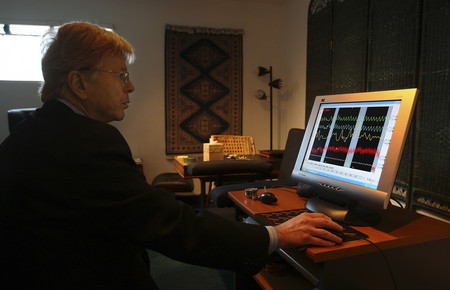Justices hear polygraph examiner case
The Nevada Supreme Court heard arguments Monday in a civil case that centers on the actions of a Las Vegas polygraph examiner.
All seven justices attended the hearing, which focused on a legal question the court has never addressed: Should a court-appointed polygraph examiner be entitled to the same type of immunity that protects judges from lawsuits?
Attorney David Mortensen argued that polygraph examiners such as his client, Ron Slay, need the protection of quasi-judicial immunity.
"If you open them up to lawsuits, who's going to come help the court?" Mortensen asked. "Why would they?"
Slay, who has conducted thousands of polygraph exams over the past three decades in his Maryland Parkway office, was sued for the first time in connection with his lie-detection work in 2007 after he tested the credibility of two parents involved in a child custody dispute.
The mother, Tiffany Barney, alleged in the lawsuit that Slay had a conflict of interest when he tested her after testing her ex-husband. She also alleged his compound and complex questions caused her to fail the exam. The results contributed to her losing custody of her daughter and ultimately exposed the child "to repeated sexual abuse at the hands of her father," according to the lawsuit.
Although Barney has regained custody of the girl, now 10, their lawyers argued that the child has only one remedy for her prior suffering: monetary damages.
"Unfortunately, that's the only recompense we can offer her," attorney Lisa Rasmussen told the high court.
Barney met Malakai "Sonny" Kaufusi in April 1998 and married him eight months later. In June 1999, shortly after learning she was pregnant, she left him. The couple's divorce was finalized in October 2001, and Barney was granted primary physical custody of their 1-year-old daughter. Kaufusi was allowed visitation.
After several months, Barney began to worry that Kaufusi was sexually abusing their child. Las Vegas police initially investigated, then turned the case over to Child Protective Services. Kaufusi was asked by CPS to submit to a polygraph exam. Slay tested Kaufusi and found him truthful, supporting the father's statement that he had not sexually abused his daughter.
According to Barney's lawsuit, Kaufusi was ordered to take another polygraph exam with a different examiner in July 2005, and he failed that test.
In March 2003, the custody case landed in Family Court Judge Jennifer Elliott's courtroom. The judge ordered Barney to submit to a polygraph exam with Slay regarding Kaufusi's allegation that the mother was using the abuse allegations to alienate his daughter from him. The judge referred the family to psychologist Stephanie Holland for an evaluation.
The next month, Barney took the polygraph exam and failed. She later would find experts who challenged that result.
Holland prepared her report for Elliott in August 2003. The psychologist's report noted that she had discussed the results of both parents' polygraph exams with Slay. Holland concluded that the child was not at risk with her father.
After receiving Holland's report, Elliott conducted a settlement conference. Barney said the meeting left her fearing that Kaufusi would receive full custody if she continued to fight. Rather than take that risk, she settled for joint custody.
Kaufusi later filed a motion for full custody. Elliott denied the motion in February 2004 and removed the child from both parents.
Elliott appointed another psychologist, Louis Mortillaro, to evaluate the ongoing allegations that Kaufusi was sexually abusing his daughter, and his testing was completed in March 2006.
After receiving his report, which remains confidential, Elliott ordered Kaufusi to undergo counseling with an expert in pedophile issues and returned the child to her mother's custody.
In January 2007, Elliott terminated Kaufusi's parental rights, almost five years after Barney first raised the sexual abuse allegations. In October 2008, Kaufusi contacted the Review-Journal after it published a story about the custody case and denied that he ever touched his daughter inappropriately.
In 2007, Barney sued both Holland and Slay, but District Judge David Barker dismissed the claims. Barney appealed only the dismissal of her claims against Slay.
Barney said the Nevada Supreme Court previously has ruled that court-appointed psychologists are immune from liability, but the high court never has granted that protection to polygraph examiners.
During an interview last year, Slay denied that his exams of both Kaufusi and Barney amounted to a conflict of interest. "I've done both sides many times," he said.
At Monday's hearing, Chief Justice James Hardesty asked Rasmussen whether she knew how frequently Family Court judges appoint polygraph examiners. The lawyer said she did not know.
During the interview last year, Slay estimated that 10 to 15 percent of his income came from Family Court cases.
The justices took Barney's appeal under submission and did not say when they would issue a ruling.
Contact reporter Carri Geer Thevenot at cgeer@reviewjournal.com or 702-384-8710.


















